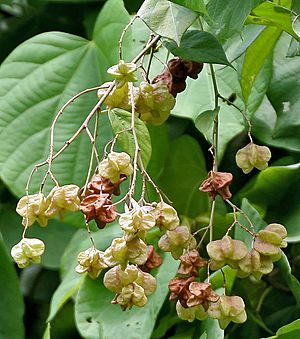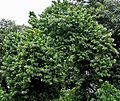Guest tree facts for kids
Quick facts for kids Guest tree |
|
|---|---|
 |
|
| Foliage and fruit in Kolkata, West Bengal, India. | |
| Scientific classification |
|
| Kingdom: | Plantae |
| Clade: | Tracheophytes |
| Clade: | Angiosperms |
| Clade: | Eudicots |
| Clade: | Rosids |
| Order: | Malvales |
| Family: | Malvaceae |
| Subfamily: | Byttnerioideae |
| Tribe: | Byttnerieae |
| Genus: | Kleinhovia L. |
| Species: |
K. hospita
|
| Binomial name | |
| Kleinhovia hospita |
|
| Script error: The function "autoWithCaption" does not exist. | |
Script error: No such module "Check for conflicting parameters".
Kleinhovia hospita is a tropical tree. It is also known as the guest tree. This tree stays green all year round. It comes from places like Indonesia, Malaysia, and other parts of tropical Asia. It is the only type of tree in its group, called the genus Kleinhovia.
About the Guest Tree
The Guest Tree is an evergreen tree. This means it stays green all year. It can grow up to 20 meters tall. That's like a six-story building! It has a thick, round top. You can often see pink flowers and fruits sticking up from its branches.
Its leaves are simple and grow one after another along the stem. They are shaped like an oval or a heart. The leaves are smooth on both sides and have a pointed tip. They have veins that spread out like fingers from the palm of a hand.
The flowers of the Guest Tree grow in loose bunches at the ends of the branches. They are usually pale pink and about 5 millimeters wide. This tree flowers throughout the whole year.
Fruit and Seeds
The Guest Tree starts making fruit quite early. Sometimes it begins in just its third year after being planted. The fruits are round and have five parts. They are thin and look like paper. Each part of the fruit holds one or two seeds. The seeds are round and whitish. They have a bumpy surface. The fruits are often easier to spot than the flowers. This is because there are so many of them and they are quite big.
Uses of the Guest Tree
People use the Guest Tree in many ways. In some parts of Malaya, Indonesia, and Papua New Guinea, it is used as a traditional medicine. It helps treat skin problems like scabies. The bark and leaves can be used to wash hair. This helps get rid of head lice. The juice from the leaves is sometimes used as an eyewash. Young leaves of the tree can even be eaten as a vegetable.
The strong fibers from the tree's bark are called bast fibers. People use these fibers to make ropes. These ropes are good for tying things or for keeping farm animals in place.
The wood of the Guest Tree is light pinkish-brown. It is soft and light, making it easy to work with. It also dries out well and is easy to finish. The leaves and bark of the tree contain special compounds. These compounds are thought to help kill tiny bugs like lice that live on the outside of animals. Scientists have also found that extracts from the leaves might help fight certain types of cancer in mice.
The Guest Tree is also grown for its beauty. Its pretty pink flowers make it a popular ornamental plant in gardens and parks.
Gallery
-
Tree in Kolkata, West Bengal, India.
-
Colour plate by Francisco Manuel Blanco
-
Immature efflorescence in Hyderabad, India
See also
 In Spanish: Tanag de Filipinas para niños
In Spanish: Tanag de Filipinas para niños
 | Delilah Pierce |
 | Gordon Parks |
 | Augusta Savage |
 | Charles Ethan Porter |




